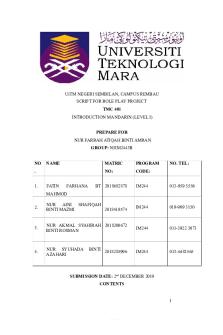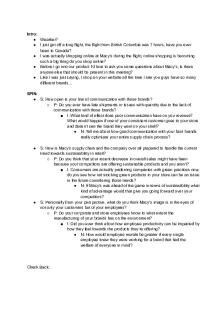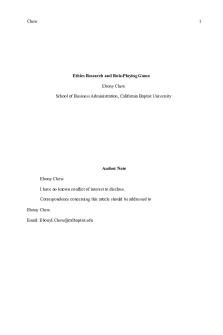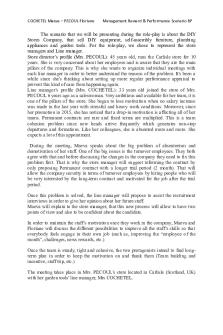Role of a school play in promoting or fostering national integration PDF

| Title | Role of a school play in promoting or fostering national integration |
|---|---|
| Course | Teacher Education |
| Institution | Jamia Millia Islamia |
| Pages | 7 |
| File Size | 79 KB |
| File Type | |
| Total Downloads | 33 |
| Total Views | 139 |
Summary
The School's Role in Promoting National Integration: Our life's and nation's goals have been transformed into the goals of our education, which are defined in the shape of a curriculum. This curriculum encompasses all subjects and activities carried out in the school in accordance with the education...
Description
Role of a school play in promoting or fostering national integration
Introduction: The School's Role in Promoting National Integration: Our life's and nation's goals have been transformed into the goals of our education, which are defined in the shape of a curriculum. This curriculum encompasses all subjects and activities carried out in the school in accordance with the educational goals. In this regard, the school plays a critical role in fostering national integration. To shape our nation's destiny and national integration, the school provides the following functions.
(I)Co-curricular Activities: A range of co-curricular activities can be used to foster national and emotional integration.
(II)Common observance and celebration of festivals and events of national significance organised in schools, for example. It is of national significance. Sports, educational excursions, tours, and picnics are examples of activities.
(iii) Military education, such as NCC and ACC.
(iv) Scouting and Guides, as well as student camps (v) Youth Festivals, Debates, and Dramatics.
These extracurricular activities aid in the development of a well-balanced and well-adjusted personality, foster a sense of community and brotherhood, widen one's horizons, and so on. Which are essential for national unity.
2. Particular Emphasis on Social Studies: For national integration, special emphasis on social studies at all levels of education is required in order to convey knowledge of the country's geographical, historical, and cultural heritage. History of the lives and works of great leaders of India and the world should be included in social studies texts. They should also incorporate works from the past, such as the Ramayana and Mahabharta.
3. Language and Scripts: In some cases, Roman Scripts may be permitted to allow pupils to strengthen their Hindi knowledge. International numerals must be used across India. Hindi is being spoken in non-Hindi locations. Hindi books in Roman scripts can be learned in non-Roman scripts, and dictionaries in Hindi-other languages can also be published in Roman scripts. Simply to popularise Hindi studies in non-Hindi areas. Similarly, Hindi novels in regional languages should be encouraged, as should Hindi dictionaries. At the university level, Hindi and English should be taught adequately. In a nutshell, Hindi should be taught in all schools across the country in order to strengthen national unity.
4. History textbooks: It is the school's responsibility to ensure that books are written in a way that promotes national integration. Schools should educate children facts that instil feelings of patriotism in them. To pique children's interest, primary level books should be rich in drawings and illustrations of great leaders.
5. National Holidays: National holidays should be observed by all schools,the 26th of January (Republic Day), the 15th of August (Independence Day), and the 10th of October, November 14 (Gandhi Jayanti) and 20 (Gandhi Jayanti) (Children Day). Lectures should be entertaining,provided with the most important topics of the day Teachers, Students and the community should participate to the fullest extent possible. 6. Greatmen's Birthdays: Greatmen's birthdays should be celebrated with honour. Celebrations of Guru Nanak Dev's, Guru Govind Singh's, Mahatama Gandhi's, Pt. Jawahar Lal Nehru's, Dr. S. Radhakrishnan's, Swami Vivekanand's, and other great men's birthdays let children learn a lot from their lives. Distinguished individuals may be invited to give talks about these great guys. 7. Respect for the national flag: Teachers and students should both respect the national flag.
The flag of the country. The history of the flag should be taught to students from the beginning. They should respect the flag by saluting it.
8. National Anthem: The national anthem should be sung at the end of all school occasions. The national anthem's meaning and significance should be taught to children.
9. National and Patriotic Songs: Patriotic songs should be sung on various occasions to express a sense of unity and our country's greatness. Students should receive sufficient training in how to sing patriotic songs.
10. Special Talks on National Unity 1 Special gatherings should be arranged on various dates, and speakers should offer lectures on issues relevant to the development of national integration.
11. Festivals should be observed: Schools should observe all important religious festivals. Celebrations of Holi, Dewali, Ramzan, Christmas, Gurupurav, and other
religious festivals, for example, bring students closer together and allow them to share their joy with others.
12. Interstate Games: Interstate games bring people together despite their differences.Schools and universities should hold such games once or twice a year in order to transform regional feelings into national feelings.
13. Organizing Camps: Camps should be held under the names of NCC, ACC, NSS, Scouting, Girls Guiding, and Social Service to promote a sense of brotherhood that is necessary for national unification.
14. Open-Air Dramas: Every school should stage an open-air drama four times a year. Themes of larism should be explored in plays & our country's independence fighters' past.
15. Uniforms: Uniforms for all Indian schoolchildren are not required. Schools may have their own preferences in terms of colour and pattern in order to instil a sense of togetherness and oneness. The disparity between rich and poor is narrowed by a uniform system.
16. National Pledge: All pupils should be required to sign the pledge, promise and repeat it twice a year, committing to help their community,countrymen. The promise encourages pupils to acquire a sense of responsibility....
Similar Free PDFs

ROLE PLAY TMC401 - role play
- 10 Pages

National integration
- 5 Pages

#2 Sales Role Play - Role play
- 4 Pages

Ethics Research Role-Play
- 5 Pages

Skrip role play
- 7 Pages

Role play scenario
- 2 Pages

Role Play script
- 7 Pages

Role Play Script
- 3 Pages

ROLE PLAY Entrevista
- 8 Pages
Popular Institutions
- Tinajero National High School - Annex
- Politeknik Caltex Riau
- Yokohama City University
- SGT University
- University of Al-Qadisiyah
- Divine Word College of Vigan
- Techniek College Rotterdam
- Universidade de Santiago
- Universiti Teknologi MARA Cawangan Johor Kampus Pasir Gudang
- Poltekkes Kemenkes Yogyakarta
- Baguio City National High School
- Colegio san marcos
- preparatoria uno
- Centro de Bachillerato Tecnológico Industrial y de Servicios No. 107
- Dalian Maritime University
- Quang Trung Secondary School
- Colegio Tecnológico en Informática
- Corporación Regional de Educación Superior
- Grupo CEDVA
- Dar Al Uloom University
- Centro de Estudios Preuniversitarios de la Universidad Nacional de Ingeniería
- 上智大学
- Aakash International School, Nuna Majara
- San Felipe Neri Catholic School
- Kang Chiao International School - New Taipei City
- Misamis Occidental National High School
- Institución Educativa Escuela Normal Juan Ladrilleros
- Kolehiyo ng Pantukan
- Batanes State College
- Instituto Continental
- Sekolah Menengah Kejuruan Kesehatan Kaltara (Tarakan)
- Colegio de La Inmaculada Concepcion - Cebu






